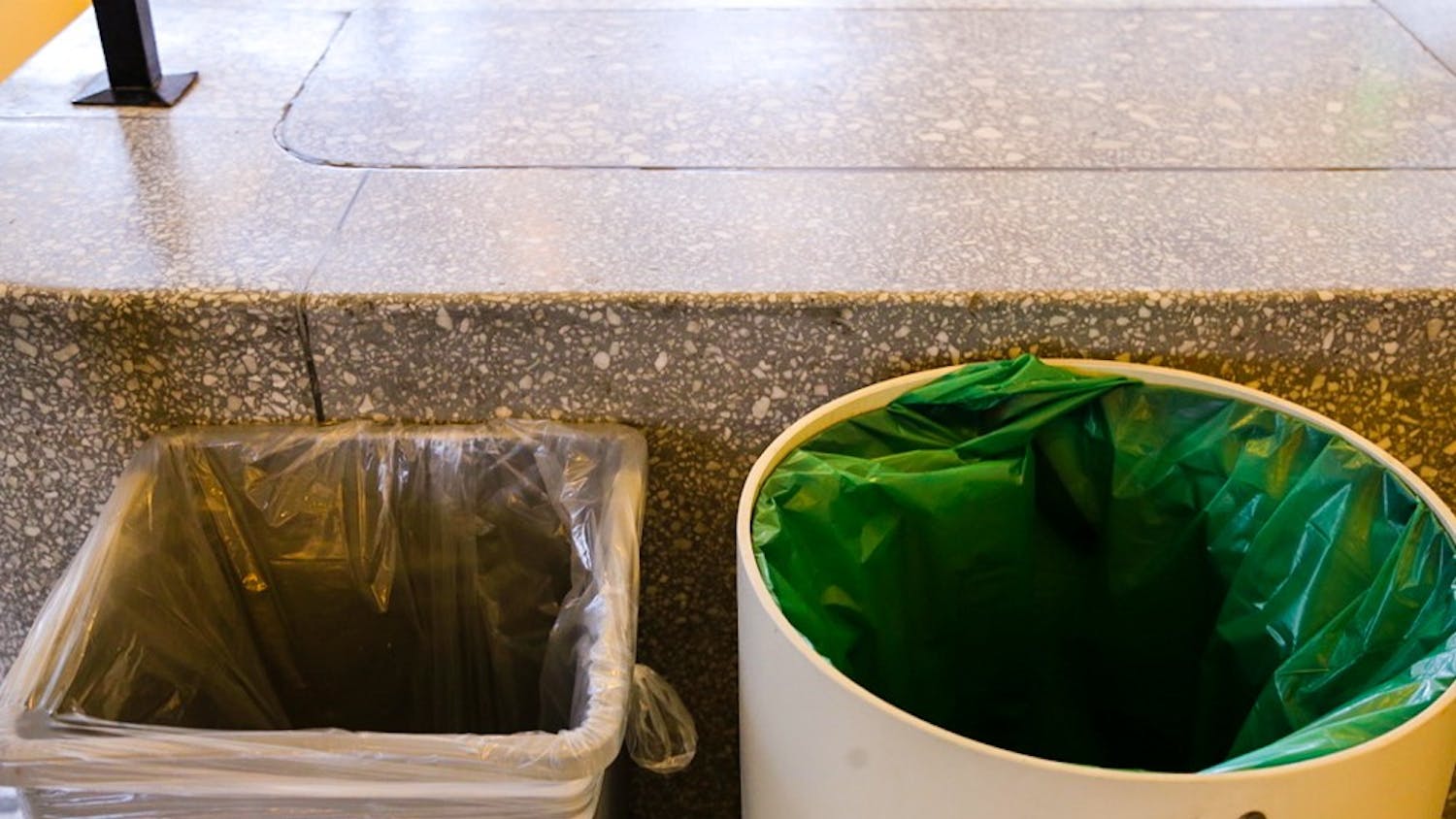This column is featured in the 2021 Winter Carnival special issue.
In my first week back on campus, I watched with helpless despair as the disposable food containers piled up in my trash can. Plastic water bottles, wrappers and yogurt containers — all adding to an ever-growing pile of waste. With recycling suspended at the College, I knew all of it would head straight for the landfill. Yes, the pandemic has created extreme circumstances — but even in normal times, we’re not as sustainable as we could be. In spite of the average Dartmouth student's environmentally conscious image, behind closed doors, we're not making responsible decisions for the Earth, and some key policy steps by the College could go a long way in disposing of bad habits.
Many students here exhibit the hallmarks of a “crunchy,” “susty” environmentalist: carrying around a Nalgene, wearing 100% recycled polyester fleece and trying their best to compost and recycle. Yet statistics show that Dartmouth simply isn’t doing well as a whole. Even before the pandemic, we underperformed our own targets for waste diversion from landfills and performed only slightly better than the national average. High levels of food contamination prevent optimum levels of recycling and were what prompted a shutdown this fall. The sheer volume of our waste is galling — we generated nearly 800,000 pounds of food waste in 2019, and that number has been increasing in recent years. In total, we generate more than seven million pounds of trash per year, and our per-capita waste generation is likely to worsen in the pandemic.
A number of groups deserve commendation for their work pushing the College in the right direction, including the Sustainability Office and its student interns. In the 2018-2019 school year, the Sustainability Office freshmen eco-representatives organized a demonstration of just how much food was left uneaten, dumping food into a bucket rather than letting the Dartmouth Dining cleaning system handle it. Despite efforts like this, food waste continues to rise. A variety of other clubs and organizations offer grants for sustainability projects and related environmental advocacy — but the College lags behind in its waste diversion agenda. There are students ready and willing to lead us in the right direction, yet as a whole, we’re not doing as much as we can.
This problem represents a fundamental failure to align values with action, to conform habits to our higher ideals — one which I’m admittedly no less guilty of than the average student. It can be so easy to make the wrong decision, with little actions accumulating into a demonstrably large impact. I throw partially rinsed yogurt containers in the recycling, leading to food contamination, telling myself it’s “good enough.” When I have a piece of waste that I don’t know is recyclable, I usually just chuck it in the trash. Despite the fact recycling could cut carbon emissions by up to 25%, I still sometimes struggle to connect the line between my action's real impact. I’m not alone in this — studies reveal that a lack of knowledge, and a belief that recycling can’t really have a large impact, often prevent people from disposing of their waste properly. These are solvable problems.
When it comes to changing habits, a few key policy “nudges” can make all the difference. As others have pointed out, increasing education and signage about recycling could make a difference. Consistent and direct communication from top-level administration about waste reduction could allow the student body to see the collective impact of what they’re doing. Colleges also tend to generate the most waste at the end of term — and there are already measures in place, such as the Sustainability Yard sale, to reuse what gets left behind. But many items aren’t eligible, such as partially-used bottles of shampoo or shaving cream, which often get thrown away before air travel. Creating a system to recycle soaps and other products (a service already widely used in hotels), is a great place to start. By no means is this list exhaustive or perfect — there’s plenty of other strong ideas out there on how to change personal sustainability habits. They just need the will and support of the College.
Let me be clear — changes in individual behavior, although important, cannot and will not solve the climate crisis or prevent environmental degradation; broad, structural changes are needed, no matter how much we recycle or turn off our lights. But, as environmentalists have pointed out, the need for collective action is not a free pass to live without a look at your own personal impact. Behavioral changes are essential to reduce emissions, and any broad climate policy should incentivize changes in day-to-day-life.
While we wait for the College to enact policy changes, there are steps that we as students can take to reduce our environmental impact. For example, you can catalog the amount of food waste you produce in a week: Create an album in your phone with pictures of the scraps of food you throw away, and by the end of the week, you’ll have a compelling visual of the problem. Similarly, you can journal the amount of plastic waste you throw away. Recognize the bad habits for what they are — habits that can be broken.
I know where I can start — cleaning out those yogurt containers completely. Every time I take the extra three seconds to clean it out, I’ll remind myself I’m contributing to the success of recycling at Dartmouth (at least, when it finally resumes). And an honest acknowledgement of what I’m accomplishing should be included. No, my small action won’t come close to what we need. Rather, the small acts of individual sustainability can be a daily environmental vigil of sorts — a moment to focus on and recognize the impact we have on the planet, while acknowledging the pressing need for broader change. So yes, you should keep carrying around your Nalgene adorned with “Keep Tahoe Blue” stickers. But we also need to make sustainable decisions, even when nobody's watching.



